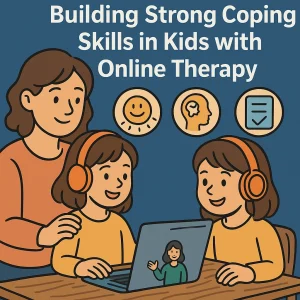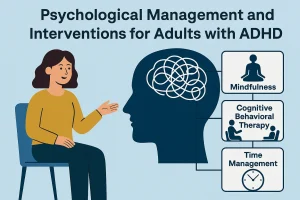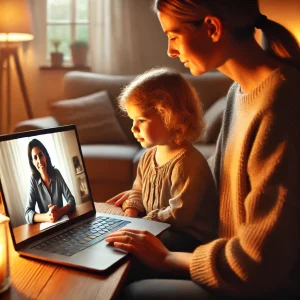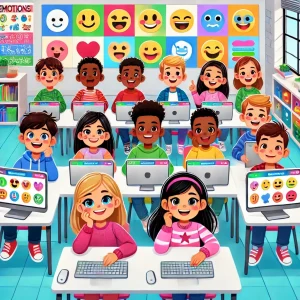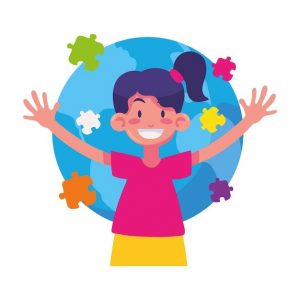Child Therapy Future: Top Trends in Online Counseling
Last Updated: August 28, 2024
Child therapy is revolutionizing with online counseling leading the way. In today’s digital age, parents and caregivers increasingly embrace online platforms to enhance their children’s mental and emotional health. Why is online counseling gaining ground? It offers unparalleled accessibility and convenience, connecting children with top experts, no matter where they are. Particularly after the pandemic disrupted traditional therapy, online counseling has proven to be not just a viable alternative, but the future of child therapy.
The Shift to Virtual Therapy Platforms
In the past few years, online therapy for kids has become very popular. As technology gets better, these platforms are offering more personalized and easy-to-use experiences for children and their families. But why are so many families choosing online therapy instead of going to in-person sessions?
One big reason is the convenience. With online therapy, families don’t have to travel or worry about missing appointments. Therapy can happen right at home, which makes it easier to fit into busy schedules. This is especially good for children who feel more comfortable in their own space.
These online platforms are also very simple to use, even for people who aren’t familiar with technology. Many of them offer extra tools and resources to help kids during their therapy.
Comparison of Traditional vs. Online Child Therapy
| Aspect | Traditional Therapy | Online Therapy |
|---|---|---|
| Accessibility | Limited by location; children need to visit the therapist’s office, which may be far from home. | Accessible from anywhere with an internet connection; ideal for children in remote or underserved areas. |
| Convenience | Fixed schedules; requires parents and children to travel to the therapy location, which can be time-consuming and costly. | Flexible scheduling; sessions can be arranged at convenient times without the need for travel. |
| Parental Involvement | Varies, often limited; parents might not always be present during sessions, and communication with therapists can be sporadic. | High, with active participation; online platforms offer tools for parents to engage in sessions and track progress. |
| Personalization | Generalized plans; therapy may follow a standard approach with limited customization due to time constraints. | Tailored, data-driven sessions; therapy plans can be customized based on real-time data and individual needs. |
| Cost | Often higher; includes additional expenses like travel, facility fees, and in-person session costs. | Potentially lower; reduced overhead costs, no travel expenses, and often more affordable session fees. |
Personalized and Tailored Therapy Sessions
One of the main benefits of online counseling for kids is that it can be customized to fit each child’s unique needs. Unlike traditional therapy, which usually follows a fixed routine, online platforms allow therapists to adjust their methods to make therapy more effective and engaging for the child.
How does this work?
It starts by understanding the child’s specific challenges and strengths. Online counseling platforms use tools and technology to gather information about how the child is doing in therapy. This helps therapists create a plan that’s just right for the child and can be easily changed as the child’s needs change.
For example, if a child enjoys certain activities during therapy, the platform can suggest similar exercises to keep the child interested. The platform also tracks the child’s progress, so the therapy plan can be updated as needed. This makes sure that the therapy is always focused on helping the child grow.
Parents are also a big part of making these personalized sessions work. In online counseling, parents are often more involved and can share important details about their child’s behavior. This helps therapists adjust their approach. Online platforms also give parents tools and resources to help support their child between sessions.
Integration of Interactive Tools and Gamification
Adding interactive tools and games to online child therapy is changing the way kids engage with their therapy. Traditional methods often involve talking or specific exercises, which can be hard for younger children to connect with. But with interactive elements and games, online therapy becomes more fun, engaging, and effective.
So, how does gamification work in child therapy?
Gamification means using game-like elements—such as points, levels, and rewards—in non-game situations like therapy. When a child participates in a therapy session that includes gamified activities, they are more likely to stay focused, motivated, and excited about their progress. These games often match the child’s interests, making therapy feel more like play than work.
The benefits of gamification go beyond just keeping the child interested. Research shows that kids who are engaged and motivated are more likely to remember what they learn in therapy and use it in real life. For example, a game that encourages a child to practice speech sounds by earning points or badges can make repetitive tasks more enjoyable and rewarding. This approach not only keeps the child engaged but also helps reinforce their learning.
What are some popular interactive tools and games used in online child therapy?
Several platforms have created games and tools specifically for therapy. For example, apps like “Autism BASICS” offer fun exercises for speech and language development. Additionally, “TeleBASICS” offers a comprehensive platform that supports diverse therapy needs, demonstrating how interactive technologies are seamlessly integrated into therapy to foster crucial skills development in a fun, engaging way.
Focus on Mental Health and Emotional Well-being
In recent years, there has been a growing focus on the importance of mental health and emotional regulation in children. Online therapy has become a powerful way to address these important parts of child development. As more people become aware of mental health issues, there is a strong movement to make sure children get the support they need.
Why is focusing on mental health so important?
For a long time, mental health issues in children were often ignored or misunderstood, leaving many kids without the help they needed. But now, as mental health becomes less stigmatized, more parents, teachers, and healthcare providers see the importance of early intervention and ongoing support. Online therapy has made it easier for children to get this support by removing barriers like distance, cost, and social stigma.
Today’s children face many challenges, like anxiety, depression, and difficulties with emotional regulation. Online therapy sessions focused on emotional well-being are designed to help children handle these challenges. These sessions often use cognitive-behavioral therapy (CBT), mindfulness practices, and other proven methods to help children understand and manage their emotions better.
What types of therapy sessions focus on emotional well-being?
There are several types of online therapy sessions that focus on mental and emotional health. For example, CBT sessions help children change negative thought patterns, while mindfulness sessions teach relaxation techniques and stress management. Emotional regulation therapy helps children understand and control their emotions, making it easier for them to deal with everyday stress and challenges.
Accessibility and Inclusivity in Therapy
Online counseling has changed how therapy is accessed, especially for children in remote or underserved areas. In the past, families in these regions often struggled to find the right therapy for their children due to a lack of local specialists or the time and cost of traveling long distances. But with the rise of online therapy, these barriers have been removed, making high-quality mental health care available to more people.
How has online counseling improved accessibility?
With digital platforms, therapy can now reach children who might not have had access to it before. Whether a child lives in a rural area or in a city with long wait times for appointments, online counseling provides a convenient and immediate solution. This ensures that children can get the care they need when they need it, which is key for effective treatment and positive results.
Besides being more accessible, online therapy is also more inclusive, offering services to children with different needs and backgrounds. For example, platforms like Wellness Hub provide a variety of services, including speech therapy, behavioral therapy, and emotional and mental health support. These platforms are flexible, offering different formats like video calls, chat sessions, and interactive tools to meet the specific needs of each child.
Cultural sensitivity is also very important in online child therapy. As online therapy reaches a wider and more diverse audience, therapists need to be aware of and sensitive to the different cultural backgrounds of the children they work with. This means understanding cultural norms, values, and communication styles that may affect how a child responds to therapy. By being culturally sensitive, therapists can create a more supportive and effective environment for all children, no matter their background.
Parental Involvement and Support
Parental involvement is crucial for the success of online therapy for children. Active participation from parents enhances the effectiveness of the sessions and provides continuous support for children beyond the virtual therapy room. Parents, often the first to notice changes in their child’s behavior or mood, are key collaborators in the therapy process. By engaging closely with therapists, they provide insights that help customize the therapy to meet their child’s needs. This cooperation ensures the skills learned during sessions are practiced at home, supporting the child’s comprehensive growth.
Online therapy platforms facilitate this involvement through features like secure messaging, video calls, and progress reports, allowing easy communication with therapists. Many platforms also enable parents to participate or observe therapy sessions, helping them understand the techniques used and how to support their child’s development at home.
The Future of Online Child Therapy: Predictions and Innovations
The future of online child therapy is poised for transformative advancements. With the integration of Virtual Reality (VR), children can enjoy immersive experiences that aid in overcoming challenges like social anxiety through safe, virtual interactions. Additionally, AI-driven tools are set to revolutionize personalized therapy, using algorithms to tailor interventions based on a child’s unique developmental journey. As technology evolves, new tools and methods will emerge, making therapy not only more accessible but also more effective, ensuring that each child receives optimal care tailored to their evolving needs.
Conclusion
The future of online child therapy is shaping up with key trends that transform accessibility, personalization, and engagement in therapy. Virtual platforms and interactive tools are crucial, catering to children’s mental health and emotional well-being. These innovations ensure that children from all backgrounds receive necessary support, leading to better mental health outcomes. As parents or caregivers, it’s vital to stay updated with these advancements. Wellness Hub is at the forefront, integrating these trends to offer top-notch care. Consider online therapy for your child’s holistic development and happiness. Stay engaged, and invest in your child’s future success with Wellness Hub.
Frequently Asked Questions:
1. What are the key trends shaping the future of online child therapy?
Trends such as the increased use of virtual therapy platforms, the integration of interactive tools and gamification, a growing focus on mental health and emotional well-being, and the development of personalized therapy sessions using AI and data analytics are shaping the future of online child therapy.
2. How does online child therapy improve accessibility for children in remote areas?
Online child therapy improves accessibility by allowing children in remote or underserved areas to receive therapy without the need for travel. This convenience ensures that more children can access high-quality mental health care from the comfort of their homes.
3. What role do parents play in online child therapy?
Parents play a crucial role in the success of online child therapy. They are actively involved in the therapy process, providing insights into their child’s behavior and reinforcing therapeutic strategies at home. Online platforms make it easier for parents to communicate with therapists and access resources to support their child’s progress.
4. How does online therapy ensure the privacy and security of children’s data?
Online therapy platforms prioritize the privacy and security of children’s data by implementing measures such as end-to-end encryption, secure login processes, and compliance with legal frameworks like HIPAA and GDPR. These protections ensure that sensitive information remains confidential and secure.
5. What innovations are expected in the future of online child therapy?
The future of online child therapy is expected to see innovations like Virtual Reality (VR) therapy sessions and AI-driven therapy tools. These advancements will offer more engaging and personalized therapy experiences, enhancing the effectiveness of treatment for children.
6. How can online therapy help with my child’s mental health and emotional well-being?
Online therapy offers various sessions focused on mental health and emotional well-being, such as cognitive-behavioral therapy (CBT) and mindfulness practices. These sessions help children manage their emotions, reduce anxiety, and improve their overall mental health.
7. Is online therapy as effective as in-person therapy for children?
Yes, online therapy can be just as effective as in-person therapy for children, especially when it is tailored to the child’s needs. The flexibility, accessibility, and use of innovative tools in online therapy can make it a highly effective option for supporting a child’s mental and emotional development.
8. What should I consider when choosing an online therapy platform for my child?
When choosing an online therapy platform for your child, consider factors such as the platform’s security measures, the types of therapy sessions offered, the qualifications of the therapists, and how the platform involves parents in the therapy process. Platforms like Wellness Hub offer comprehensive and secure options tailored to children’s needs.
9. How does gamification enhance the effectiveness of online child therapy?
Gamification enhances the effectiveness of online child therapy by making sessions more engaging and enjoyable for children. By integrating game-like elements into therapy, children are more motivated to participate and retain what they learn, leading to better therapeutic outcomes.
10. Can online child therapy be customized to my child’s specific needs?
Yes, online child therapy can be highly customized to meet your child’s specific needs. Therapists use tools like data analytics and AI to create personalized treatment plans that adapt to your child’s progress, ensuring that therapy is both effective and relevant.
About the Author:
Anuradha Karanam
Speech-language pathologist (7+ years of experience)
Anuradha Karanam, a skilled speech-language pathologist, has over 6 years of experience. Fluent in Tamil, Telugu, Hindi, and English, she specializes in parent counseling, speech sound disorders, fluency assessment, and speech-language evaluations. Anuradha excels at working with children with developmental disorders, offering creative and effective therapy programs. She currently works at Wellness Hub, holding a BASLP degree and registration with the RCI (CRR No A85500). Her patience, ambition, and dedication establish her as a trusted expert in her field.
Book your Free Consultation Today
Parent/Caregiver Info:
Client’s Details:
* Error Message
